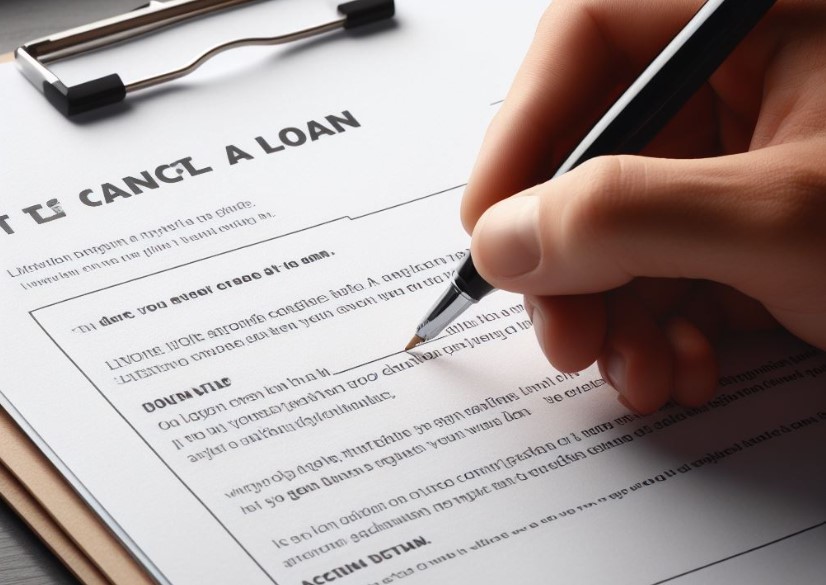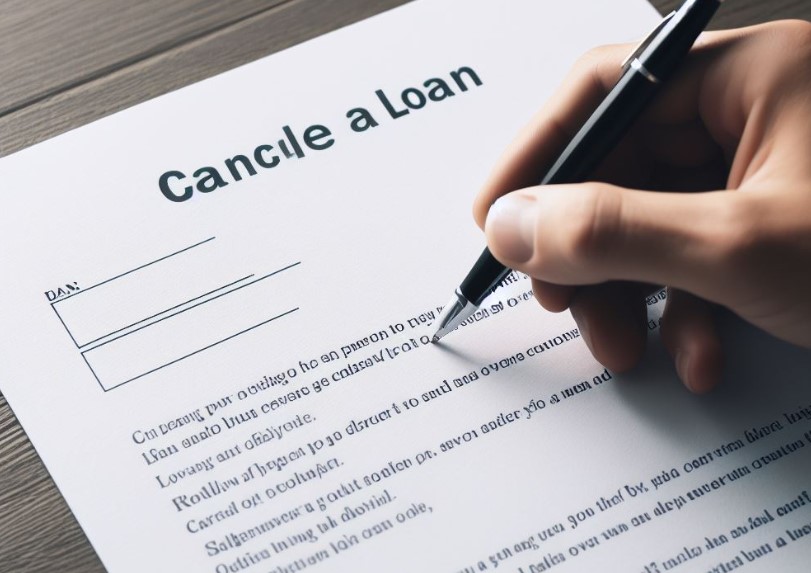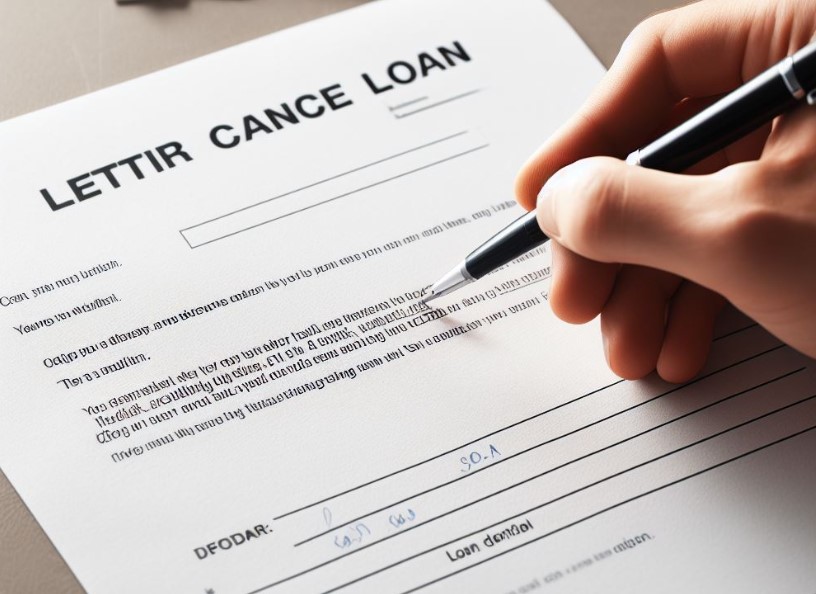When it comes to financial management, knowing How Do You Write A Letter To Cancel A Loan? can be a crucial skill. Whether you’ve found a better loan offer, your financial circumstances have changed, or you no longer need the loan, a well-crafted cancellation letter is key.
This document serves as a formal request to your lender, outlining your intent to cancel the loan agreement. It’s essential to handle this communication professionally to ensure a smooth process and maintain good relations with the lender.
Key Takeaways
- Understand the importance of a professionally written loan cancellation letter.
- Know the essential components to include in the letter.
- Learn the proper formatting and tone for effective communication.
- Discover tips for ensuring your cancellation request is processed smoothly.
How Do You Write A Letter To Cancel A Loan?
To write a letter to cancel a loan, start by addressing the letter to the appropriate contact at the lending institution. Include your personal information (name, address, phone number) and any relevant loan details (loan number, type). Clearly state your intention to cancel the loan in the opening paragraph.

Provide a brief explanation for the cancellation, if applicable. Mention the date of your application or the agreement signing, and request a confirmation of the cancellation. Conclude with a formal closing, your signature, and the date. Ensure the letter is concise, clear, and professionally formatted. Send it via a method that provides a delivery confirmation.
The Essence of a Loan Cancellation Letter
What is a Loan Cancellation Letter?
A loan cancellation letter is a formal document sent to a lender, indicating your desire to cancel a loan application or agreement. It’s a crucial step in ensuring that all parties are clear about the cancellation and that it’s documented properly. The letter should be concise, and clear, and include specific details about the loan, ensuring no ambiguity.
Why is It Necessary?
Canceling a loan can save you from unnecessary financial burdens or better align with your current financial strategy. This letter is your official notice to the lender, protecting you from possible misunderstandings or legal complications. It’s a demonstration of your financial responsibility and your commitment to maintaining a positive credit profile.
Crafting the Perfect Loan Cancellation Letter

Essential Components to Include
When writing a loan cancellation letter, certain elements are non-negotiable:
- Your personal details: Name, address, and other relevant contact information.
- Loan information: Account number, loan type, and any other specific details.
- Clear request for cancellation: State your intention plainly.
- Reason for cancellation: While not always mandatory, providing a reason can sometimes facilitate the process.
- Date of request: To establish a timeline for your request.
Structuring Your Letter
Your letter should follow a clear, professional format:
- Heading: Your contact information, followed by the date, and then the lender’s details.
- Salutation: A formal greeting to the appropriate contact person.
- Body: A concise, clear statement of your intent, including all necessary details.
- Closing: Politely conclude the letter and include a signature.
Understanding Lender’s Perspective
The Lender’s Process in Loan Cancellation
Upon receiving your letter, the lender will review your request. They may contact you for additional information or confirmation. Understanding their process can help you anticipate any potential questions and respond promptly.
How to Facilitate Smooth Processing?
- Contact the lender in advance: A phone call before sending the letter can prepare them for your request.
- Follow up: After sending the letter, a follow-up call or email ensures your request is being processed.
Legal and Financial Implications

Potential Impact on Credit Score
Cancelling a loan can affect your credit score, depending on how far the loan process has progressed. It’s important to understand these implications and, if necessary, consult with a financial advisor.
Ensuring Legal Compliance
Your letter should comply with any legal requirements pertaining to loan cancellation. This might include referencing specific clauses in your loan agreement that allow for cancellation.
When Circumstances Change?
Changing Financial Situations
Your financial situation can change after you’ve applied for a loan. Canceling the loan might be necessary to avoid financial strain.
Finding Better Loan Offers
If you find a more favorable loan offer after applying, canceling the existing loan application might be a wise financial decision.
The Art of Communication
The Right Tone and Language
Your letter should be formal and respectful. Clear, straightforward language is best to avoid any misunderstandings.
Importance of Clarity and Precision
Every detail in your letter should be precise, especially regarding loan details and your personal information. This clarity eliminates any potential confusion.

Understanding Your Lender’s Policy
Every lender has unique policies regarding loan cancellation. It’s vital to familiarize yourself with these before drafting your cancellation letter. This understanding can help tailor your letter to align with specific requirements, increasing the likelihood of a smooth cancellation process. Research the lender’s policy on their website or contact their customer service for clarification.
Customizing Your Letter to Fit the Policy
Once you’re aware of the lender’s policy, customize your letter accordingly. For instance, if the lender requires specific information or a particular format, ensure your letter adheres to these requirements. Tailoring your letter not only shows professionalism but also demonstrates your respect for the lender’s procedures, fostering a positive relationship.
Timing and Its Importance
The Role of Timing in Loan Cancellation
Timing is crucial when canceling a loan. The sooner you submit your cancellation letter after deciding not to proceed with the loan, the better. Early cancellation can minimize any impact on your credit score and reduce the likelihood of incurring charges or fees associated with the loan processing.
Avoiding Delays in the Cancellation Process
To avoid delays, promptly prepare and send your cancellation letter. Ensure all required information is included to prevent the lender from needing to request additional details, which can prolong the process. Quick and efficient communication is key to a timely resolution.
Effective Follow-Up Strategies

Monitoring the Cancellation Process
After sending your loan cancellation letter, it’s important to actively monitor the process. Keep a record of all communications with the lender, including dates and summaries of conversations. This documentation can be invaluable if there are any disputes or misunderstandings about the cancellation.
Effective Communication Post-Cancellation
Maintaining open lines of communication with your lender even after sending the cancellation letter is crucial. Regularly check in to ensure your request is being processed and to address any potential issues promptly. Effective communication can greatly expedite the cancellation process.
Potential Challenges and Solutions
Common Challenges in Loan Cancellation
Loan cancellation can present challenges such as delays in processing, misunderstandings regarding the cancellation reasons, or reluctance from the lender. Being prepared for these potential issues can help you navigate them more effectively.
Solutions to Overcome These Challenges
To overcome these challenges, maintain clear, consistent communication with the lender. Be prepared to provide additional information if needed and respond promptly to any inquiries from the lender. Patience and persistence are often key in resolving any hurdles that arise during the cancellation process.
Maintaining Financial Stability
Impact on Financial Planning
Canceling a loan can have implications for your financial planning. It may free up financial resources for other uses or necessitate a revision of your budget and financial goals. Consider the broader financial implications of loan cancellation in your overall financial strategy.
Future Loan Considerations
If you plan to apply for loans in the future, remember that loan cancellation can be a factor in a lender’s decision-making process. Maintain a strong credit profile and be prepared to explain the reasons for past loan cancellations to future lenders.
What Are the Essential Steps in Drafting a Loan Termination Request?

Initiating the Process with a Clear Plan
The first step in drafting a loan termination request is to have a clear and structured plan. This involves understanding the reasons for terminating the loan and how it aligns with your financial goals.
It’s essential to assess your financial situation thoroughly and determine the implications of terminating the loan. A well-thought-out plan ensures that your request is not only strategic but also aligns with your long-term financial health.
Gathering Necessary Information and Documents
Before drafting the request, gather all necessary information and documents related to your loan. This includes your loan agreement, account details, and any correspondence with the lender. Having all relevant information at hand simplifies the process of writing your request and ensures that you include all necessary details, making your request clear and effective.
How to Communicate Effectively with Your Lender About Terminating a Loan?
The Importance of Clear and Professional Communication
Effective communication with your lender is crucial when seeking to terminate a loan. It’s important to approach the conversation with clarity and professionalism. Clearly state your intentions and provide the reasons for your decision. Be prepared to discuss any concerns or questions your lender may have. This open and honest communication can help facilitate a smoother process.
Building a Positive Relationship with Your Lender
Building and maintaining a positive relationship with your lender is vital. Even when terminating a loan, it’s important to be respectful and understanding of the lender’s perspective. A positive relationship can aid in the negotiation process and might be beneficial for future financial dealings. Remember, a respectful and cordial approach can often lead to more favorable outcomes.
What Should You Avoid When Cancelling a Loan?

Common Mistakes to Avoid in Loan Cancellation
When canceling a loan, there are several pitfalls to avoid. First, never rush into sending a cancellation request without fully understanding the terms of your loan and the potential consequences. Avoid being vague or unclear in your communication. Additionally, failing to provide all necessary information can lead to delays or complications in the cancellation process.
Ensuring Compliance and Understanding Terms
It’s crucial to ensure that you comply with all terms and conditions outlined in your loan agreement. Understand any fees, penalties, or other implications associated with loan cancellation. Ignorance of these details can lead to unexpected financial burdens. Thoroughly reviewing your loan agreement and seeking clarification on any unclear terms can prevent these issues.
What Are the Financial Implications of Loan Cancellation?
Immediate and Long-Term Financial Impact
Cancelling a loan can have both immediate and long-term financial implications. In the short term, you might incur cancellation fees or penalties. In the long term, it could affect your credit score or your relationship with lenders. It’s essential to weigh these implications against the potential benefits of canceling the loan.
Planning for Future Financial Stability
Post-cancellation, it’s important to revisit and possibly revise your financial plan. Consider how this change affects your budget, savings, and future borrowing needs. Ensuring that your financial goals remain achievable, even after loan cancellation, is a critical step in maintaining long-term financial stability.
How Can You Reapply for a Loan After a Cancellation?

Assessing the Right Time to Reapply
If you decide to reapply for a loan after a cancellation, timing is key. Assess your financial situation and ensure that you’re in a stable position to take on a new loan. This might mean waiting until your credit score improves or your financial circumstances become more favorable.
Preparing a Strong Application
When you’re ready to reapply, prepare a strong application. This includes having a clear purpose for the loan, ensuring your credit history is in good shape, and having all necessary documentation in order. A well-prepared application increases your chances of approval and demonstrates your reliability as a borrower.
Conclusion
Writing a letter to cancel a loan is more than a mere administrative task; it’s a crucial step in managing your financial health. This letter should be clear, precise, and professionally formatted.
By understanding both the borrower’s and lender’s perspectives, you can ensure a smooth cancellation process. Remember, this letter not only serves to cancel your loan but also protects your financial interests and credit rating.
Frequently Asked Questions
Can I cancel a loan after signing the agreement?
Yes, you can cancel a loan after signing the agreement, but the process and implications vary depending on the lender’s policies and the terms of the agreement. Generally, there’s a grace period during which you can cancel without penalty. It’s essential to read your loan agreement carefully to understand the specific terms and conditions related to cancellation.
What is the typical grace period for canceling a loan?
The grace period for loan cancellation varies by lender and type of loan. For many personal loans, the grace period could be anywhere from 24 hours to a few days post-acceptance. Some loans, like mortgages, may have different time frames due to regulatory requirements.
Are there any fees associated with cancelling a loan?
Fees for cancelling a loan depend on the lender and the type of loan. Some lenders may charge a cancellation fee, while others might not. Additionally, if the loan process has advanced significantly, there could be processing fees involved. It’s important to clarify this with your lender before proceeding.
How do I write an effective loan cancellation letter?
An effective loan cancellation letter should be concise, clear, and formal. Include your personal and loan details, a straightforward request for cancellation, and the reason for cancellation (if applicable). It’s also important to format the letter professionally and send it via a traceable method.
A multifaceted professional, Muhammad Daim seamlessly blends his expertise as an accountant at a local agency with his prowess in digital marketing. With a keen eye for financial details and a modern approach to online strategies, Daim offers invaluable financial advice rooted in years of experience. His unique combination of skills positions him at the intersection of traditional finance and the evolving digital landscape, making him a sought-after expert in both domains. Whether it’s navigating the intricacies of financial statements or crafting impactful digital marketing campaigns, Daim’s holistic approach ensures that his clients receive comprehensive solutions tailored to their needs.








